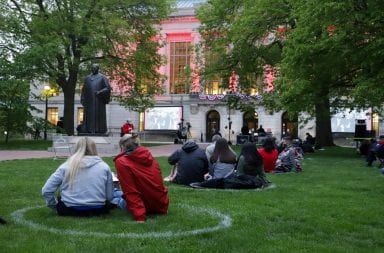Greg Mortensen, author of “Three Cups of Tea” — a memoir that has comfortably remained on The New York Times best-sellers list for the past 219 weeks — might be a philanthropic phony.
Last Sunday, “60 Minutes” ran an exposé on Mortensen, blowing the whistle on his charity, his book and sullying his veracious reputation. “60 Minutes” revealed that Mortensen’s charity, the Central Asia Institute, “spends more money domestically promoting the importance of building schools in Afghanistan and Pakistan than it does actually constructing and funding them overseas.” When visiting 30 of the 141 schools built under the auspices of Mortensen, “60 Minutes” found that half functioned reasonably well, but the other half were either poorly constructed, used as storage facilities, or even nonexistent.
The very plot of Mortensen’s book is dubious. Mortensen claimed that he was held for eight days by the Taliban; “60 Minutes” was able to track down a few of his supposed captors who revealed that they were not kidnappers, rather they were his hosts and they were never part of the Taliban. One of his alleged captors is actually the director of a research tank in Pakistan. Clad in western business attire he refuted Mortensen’s assertion saying, “This is totally false, and he is lying.”
As an admirer inspired by Mortensen’s dogged commitment to children’s education in Afghanistan and Pakistan, hearing “60 Minutes” besmirch his character and his work was wholly disheartening. But this disillusionment of an exemplary philanthropist is both necessary and imperative.
Philanthropy is not all peaches. All people, Samaritans or not, have their own interests. The degree of this self-interest needs to measured.
Fortunately, a few websites perform this measurement. Charity Navigator “works to advance a more efficient and responsive philanthropic marketplace” by analyzing the “financial health” of more than 5,000 American charities. It does this by sharing data on the expense breakdown for the charity, rating its organizational efficiency, even disclosing the charity’s total revenue and the salary of the head director. Similarly, The American Institute of Philanthropy, a charity watchdog, ranks organizations based on their financial performance determining how generous a charity truly is.
The Wall Street Journal recently reported on charity scams involving the crisis in Japan. Fraudulent charities using heart-rending language spammed the emails of benevolent souls. Donors took the bait and thousands of dollars went in the pockets of the unscrupulous miscreants, not to victims in dire need. Scams like this are completely avoidable. Donations are desired in a multitude of the world’s problem areas — a simple check can prevent the profits of charlatans and maximize the utility of each dollar by donating to only the most efficient and altruistic charities.
Mortensen, whether the “60 Minutes” investigation rings true, has done a good deed — he has helped many children in Afghanistan and Pakistan obtain an education they otherwise would not receive. However, the extent of his good work has been enormously inflated. Shattering the sacrosanct image of charities does not mean losing hope and faith in philanthropy. One must replace blind-giving with a realistic perspective. Reconsider where you give, don’t reconsider giving. Simply, remember Reagan’s catchphrase, “trust, but verify.”


